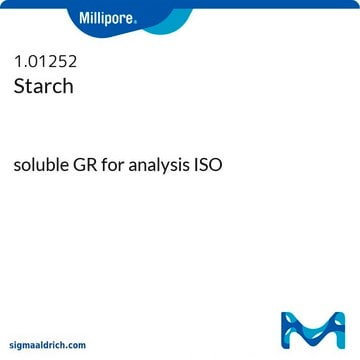All Photos(1)
About This Item
Linear Formula:
(C6H10O5)n
CAS Number:
EC Number:
MDL number:
UNSPSC Code:
12352201
PubChem Substance ID:
Recommended Products
Quality Level
Looking for similar products? Visit Product Comparison Guide
Application
For determination of α-amylase (diastase) activity.
Storage Class Code
11 - Combustible Solids
WGK
nwg
Flash Point(F)
Not applicable
Flash Point(C)
Not applicable
Choose from one of the most recent versions:
Already Own This Product?
Find documentation for the products that you have recently purchased in the Document Library.
Customers Also Viewed
Prameela Krishnan et al.
Journal of bioscience and bioengineering, 117(4), 512-518 (2013-11-19)
Changes in water status of developing grains of maize (Zea mays L.) grown under different nitrogen levels were characterized by nuclear magnetic resonance (NMR) spectroscopy. There were distinct changes in water status of grains due to the application of different
Joao F Requicha et al.
Journal of orthopaedic research : official publication of the Orthopaedic Research Society, 32(7), 904-909 (2014-03-08)
Damages in the maxillofacial bones are frequent in humans following trauma, metabolic diseases, neoplasia, or inflammatory processes. Many of the available treatments to regenerate bone are often ineffective. The goal of this work was to assess the in vivo behavior
Anne Krog Ingerslev et al.
The British journal of nutrition, 111(9), 1564-1576 (2014-02-11)
The effects of increased colonic fermentation of dietary fibres (DF) on the net portal flux (NPF) of carbohydrate-derived metabolites (glucose, SCFA and, especially, butyrate), hormones (insulin, C-peptide, glucagon-like peptide 1 and glucose-dependent insulinotropic peptide) and NEFA were studied in a
Kathrin Deckardt et al.
Nutrients, 5(6), 1970-1988 (2013-06-06)
High-producing ruminants are fed high amounts of cereal grains, at the expense of dietary fiber, to meet their high energy demands. Grains consist mainly of starch, which is easily degraded in the rumen by microbial glycosidases, providing energy for rapid
Anne Beilvert et al.
The Laryngoscope, 124(4), 875-881 (2013-10-10)
In sialendoscopy, stents are often used to keep the salivary duct open after surgery. These stents need to be removed. Recently, our group developed a new starch-based shape-memory material that is a widespread degradable polymer. Such a device could be
Our team of scientists has experience in all areas of research including Life Science, Material Science, Chemical Synthesis, Chromatography, Analytical and many others.
Contact Technical Service






